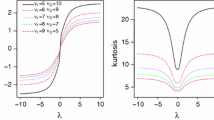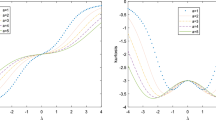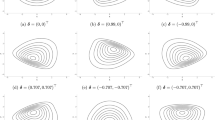Abstract
A scale-shape mixtures of flexible generalized skew normal (SSMFGSN) distributions is proposed as a novel device for modeling asymmetric data. Computationally feasible EM-type algorithms derived from the selection mechanism are presented to compute maximum likelihood (ML) estimates of SSMFGSN distributions. Some characterizations and probabilistic properties of the SSMFGSN distributions are also studied. Monte Carlo simulations show that the proposed estimating procedures can provide desirable asymptotic properties of the ML estimates and demand less computational burden in comparison with other existing algorithms based on convolution representations. The usefulness of the proposed methodology is illustrated by analyzing a real dataset.




Similar content being viewed by others
References
Akaike H (1973) Information theory and an extension of the maximum likelihood principle. In: 2nd international symposium on information theory. Akademiai Kiado, Budapest, pp 267–281
Arellano-Valle RB, Ferreira CS, Genton M (2018) Scale and shape mixtures of multivariate skew-normal distributions. J Multivar Anal 166:98–110
Azzalini A (1985) A class of distributions which includes the normal ones. Scand J Stat 12:171–178
Azzalini A, Capitanio A (2003) Distributions generated by perturbation of symmetry with emphasis on a multivariate skew \(t\)-distribution. J R Stat Soc Ser B 65:367–389
Basford KE, Greenway DR, Mclachlan GJ, Peel D (1997) Standard errors of fitted means under normal mixture. Comput Stat 12:1–17
Basso RM, Lachos VH, Cabral CRB, Ghosh P (2010) Robust mixture modeling based on scale mixtures of skew-normal distributions. Comput Stat Data Anal 54:2926–2941
Branco MD, Dey DK (2001) A general class of multivariate skew-elliptical distributions. J Multivar Anal 79:99–113
Chai T, Draxler RR (2014) Root mean square error (RMSE) or mean absolute error (MAE)?—Arguments against avoiding RMSE in the literature. Geosci Model Dev 7:1247–1250
Dempster AP, Laird NM, Rubin DB (1977) Maximum likelihood from incomplete data via the EM algorithm (with discussion). J Roy Stat Soc Ser B 9:1–38
Ferreira CS, Bolfarine H, Lachos VH (2011) Skew scale mixtures of normal distributions: properties and estimation. Stat Methodol 8:154–171
Gómez HW, Venegas O, Bolfarine H (2007) Skew-symmetric distributions generated by the distribution of the normal distribution. Environmetrics 18:395–407
Gómez-Sánchez-Manzano E, Gómez-Villegas MA, Marín JM (2008) Multivariate exponential power distributions as mixtures of normal distributions with Bayesian applications. Commun Stat Theory Methods 37:972–985
Good IJ (1953) The population frequencies of species and the estimation of population parameters. Biometrika 40:237–260
Jamalizadeh A, Lin TI (2017) A general class of scale-shape mixtures of skew-normal distributions: properties and estimation. Comput Stat 32:451–474
Lin TI, Lee JC, Hsieh WJ (2007a) Robust mixture modeling using the skew \(t\) distribution. Stat Comput 17:81–92
Lin TI, Lee JC, Yen SY (2007b) Finite mixture modelling using the skew normal distribution. Stat Sin 17:909–927
Lin TI, Ho HJ, Lee CR (2014) Flexible mixture modelling using the multivariate skew-\(t\)-normal distribution. Stat Comput 24:531–546
Liu CH, Rubin DB (1994) The ECME algorithm: a simple extension of EM and ECM with faster monotone convergence. Biometrika 81:633–648
Ma Y, Genton MG (2004) Flexible class of skew-symmetric distributions. Scand J Stat 31:459–468
Meng XL, Rubin DB (1993) Maximum likelihood estimation via the ECM algorithm: a general framework. Biometrika 80:267–278
Schwarz G (1978) Estimating the dimension of a model. Ann Stat 6:461–464
Smirnov NV (1948) Tables for estimating the goodness of fit of empirical distributions. Ann Math Stat 19:279–281
Wang WL, Jamalizadeh A, Lin TI (2020) Finite mixtures of multivariate scale-shape mixtures of skew-normal distributions. Stat Pap 61:2643–2670
West M (1987) On scale mixtures of normal distributions. Biometrika 74:646–648
Acknowledgements
The authors gratefully acknowledge the editors and three anonymous referees for their insightful comments and constructive suggestions that greatly improved the quality of this paper. This research was supported by the Ministry of Science and Technology of Taiwan under Grant No. 109-2118-M-005-005-MY3.
Author information
Authors and Affiliations
Corresponding author
Additional information
Publisher's Note
Springer Nature remains neutral with regard to jurisdictional claims in published maps and institutional affiliations.
Appendix A: Proof of Eq. (27)
Appendix A: Proof of Eq. (27)
Without loos of generality, we assume that \(\xi =0\) and \(\sigma =1\). Let \(Y\overset{d}{=}(\tau ^{-1/2})Z_1\vert (\tau ^{-1/2}Z_2<\lambda _1(\tau ^{-1/2}Z_1)+\cdots +\lambda _m(\tau ^{-1/2}Z_1)^{2m-1})\), where \(Z_1\) and \(Z_2\) are two independent N(0, 1) variables and \(\tau \sim \varGamma (\nu /2,\nu /2)\). Clearly, \((X_1,X_2)^\top \overset{d}{=}\tau ^{-1/2}(Z_1,Z_2)^\top \sim t_2({\mathbf {0}},I_2,\nu )\), where following a bivariate t distribution \(I_2\) is an identity matrix of order 2. Therefore, we have \(X_1\sim t(0,1,\nu )\), \(X_2\sim t(0,1,\nu )\) and \(\sqrt{\frac{\nu +1}{\nu +z^2}}X_2\vert (X_1=z)\sim t(0,1,\nu +1)\). By Bayes’ theorem, the pdf of \(Y\overset{d}{=}X_1\vert (X_2<\lambda _1X_1+\cdots +\lambda _mX_1^{2m-1})\) is
Rights and permissions
About this article
Cite this article
Mahdavi, A., Amirzadeh, V., Jamalizadeh, A. et al. Maximum likelihood estimation for scale-shape mixtures of flexible generalized skew normal distributions via selection representation. Comput Stat 36, 2201–2230 (2021). https://doi.org/10.1007/s00180-021-01079-2
Received:
Accepted:
Published:
Issue Date:
DOI: https://doi.org/10.1007/s00180-021-01079-2
Keywords
Profiles
- Abbas Mahdavi View author profile




